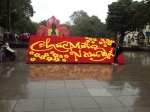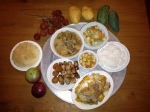Category Archives: Rituals
Celebrating Public Holidays
One aspect of life abroad that can be both fascinating and frustrating for expats is that of Public Holidays.
Here in Vietnam there are nine weekday holidays, of which we’ve so far had 8.
Having arrived ‘post event’ in 2012, we decided to stay put for TET this year, despite the hugely conflicting advice about the wisdom (or otherwise) of such a decision, particularly given the proximity of our house to Phu Tay Ho – the main temple in Hanoi which is dedicated to the Mother Goddess. Changing date in accordance with the Lunar Calendar, TET this year was celebrated between 9th and 14th February and the whole area around the temple was turned into a cross between a carnival and carnage. Next year we will be going somewhere quieter – anywhere that doesn’t recognise this as new year.
On the 19th April we had a day off for King Hung’s day to commemorate the first King of Lac Viet and this week we enjoyed a two-day break. 30th April was Vietnam Victory/ Reunification/Liberation Day (depending on your affiliation/geographic location) to mark the fall of Saigon and the reunification of Vietnam in 1975. And yesterday, 1st May, was International Worker’s day which celebrates the economic and social achievements of workers throughout the year (not sure how these achievements are measured or whether they’re just assumed?).
Unlike in the UK where all Bank Holidays (apart from Christmas and New Year) are shifted to the nearest Monday – public holidays fall on the ‘correct’ day here so it is not unusual to have a Tuesday and Wednesday off – as we’ve just witnessed.
The reason that I find these holidays stressful is because they are completely alien to me. I can’t always work out what is being celebrated. I’m conscious that sometimes even the name of the holiday can be cause of contention – as in the case of Reunification/Liberation Day. And it’s extremely hard, as a foreigner who doesn’t speak the language, to work out how the Vietnamese celebrate or enjoy said holiday.
I’m reminded of my first Introduction to Islam lecture at the University of Manchester when the lecturer posed the questions – which Islam, when, where and for whom? His point being that, like much in life, there is no one ‘right’ answer – Islam is many different things to many different people. So too is the way of celebrating national holidays.
TET is the big one – similar to the Western Christmas – with presents, food, food and more food, some alcohol, spending time with people you don’t necessarily see the rest of the year, rituals, traditions and an enormous amount of pressure. It is, for the Vietnamese I’ve spoken to at least, both expensive and tiring and something approached with very mixed feelings. Sound familiar?
The last two days have felt like a weekend and so today must be Monday, which for some reason everyone else is calling Thursday! Hubby was off work but you wouldn’t have known it thanks to the constant beeping of his Blackberry and because he works in an international consultancy firm with colleagues around the world blissfully unaware that he was ‘on holiday’.
Which brings me onto the topic of how expats celebrate public holidays in their host country. Many, particularly the more seasoned foreigners and those with children, simply flee. Hanoi in particular engenders this desire because whilst it’s an amazing and vibrant city, it can drive you crazy with its constant noise, dust, humidity and general air of disorganisation. Depending on the length of holiday many people take the chance for an adventure exploring parts of Vietnam they haven’t previously visited, others head for a beach or 5 star resort and recharge their batteries beside a pool. Some friends of ours took advantage of one of the great deals offered to foreign residents and enjoyed a ‘staycation’ at a beautiful hotel on the opposite side of town to where they live and work.
We seem to be a little slow on the uptake and have so far been here for every public holiday. Now that we’ve enjoyed experiencing them – in that strange twilight zone between not being a local and not being a tourist, we have both agreed that we’ve ticked the box marked ‘Experience Public Holidays in Vietnam’ and will, in future, take the chance to be tourists in another city, enjoying everything that that entails. Staying put has meant that we’ve paid more for pretty much everything we’ve bought as local shops and restaurants all raise their prices at holiday time and we haven’t been able to enjoy the fresh ingredients we’ve become used to because, for example, the dairy producing the milk we like was closed for the holidays and the markets and small traders we usually buy from simply didn’t bother opening.
So here’s to our next public holiday, Monday 2nd of September when we’ll be celebrating Vietnamese Independence Day on a beach somewhere, or maybe even in Cambodia, Taiwan or Japan.
Paying Our Respects
“Today madam we should pay our respects to the landlord’s mother” announced Chi. Great I thought, having been bitterly disappointed that we missed out on the actual funeral a few days earlier. Don’t get me wrong, I’m not somebody who delights in death or bearing witness to another’s sorrow. In fact I have probably caused more harm along the way with my complete horror of causing pain to another person – with the things not said and the actions not taken – than any mischief I might have carried out intentionally.
No, my delight is because I am intrigued by how others do things. How they conduct the rituals of life and how we learn what is expected of us simply by ‘being there’. And what better way to observe, at least a small part of, the rituals surrounding death here in Vietnam than by going along to pay my respects to a lady I have never met, for a man I never knew?
Despite being acutely aware of how little I know about Vietnamese societal norms, one thing is for sure – I can recognise a mother’s pain in any language and can think of nothing worse than the raw agony of losing your child, no matter how old they are.
Chi explained that we should take fruit and an envelope each on which we must write some words of condolence. It was agreed that I should write what I would in the UK to someone I didn’t know and so, conscious of the need to translate it too, I opted for a rather bland:
We are very sorry for your loss.
Warm wishes, Kevin and Karen
Into the envelope we were to put 100,000 Vnd per person (i.e. 200,000 in my envelope and 100,000 in Chi’s – which she refused to let me pay)
At 2p.m., which Chi considered to be the right time to visit, she called our landlord and landlady and, getting no reply, set off next door to find out what time would be convenient.
The mother was there but about to go back to her own house along the alley. A few minutes later and Chi’s ‘phone rang to signal that we should set off. Walking Sally through all the inter-connecting lanes on a daily basis, I already knew the house to which we should make our way but the landlord’s 23-year old son was waiting at our gate to escort us.
On arriving Chi pushed me forward saying: “You are older than me, you must go first”. So there I was, straight into the front room as is typical in Vietnamese houses. The grieving mother looked to be in her 80s but I find local people incredibly difficult to age accurately.
We were handed a plate on which Chi arranged our envelopes and the fruit (grapes the size of golf balls because as Chi said: “They will be offered to other visitors and everyone will know that they were brought by the ‘tay’ – the foreigners”) This she then placed on the altar where we stood side by side with hands raised, flat together in a symbol of respect and prayer. We dipped our hands three times before the photo of the deceased, made a small bow and sat on the hard wooden chairs beloved of Hanoians, to chat about the deceased take tea and eat fruit. (I learned that the Vietnamese way to eat a banana is to snap it in the middle and delicately unpeel one half at a time eating it as you unpeel. My rather ungainly and faintly obscene ‘Western’ way had me cursing the previous visitors for not having had the foresight to have taken grapes too)
The mother, my landlady and the deceased’s sister all sat with us chatting, with Chi translating, bridging the divide and asking all the questions I longed to ask but would have felt to be impolite even if I could speak Vietnamese. (They have no such qualms and to say that they ‘call a spade a spade’ would be under-emphasising just how blunt they truly are). The old lady started to cry and kept saying “Cam On” (thank you) over and over. Chi explained that she was so moved that I had taken the time to visit and that the whole family are most grateful to Kevin and me for caring about them. I confess I felt slightly guilty at just how fascinating a pleasure this visit was for me and muttered the obligatory platitudes, you’re welcome, it’s nothing …..
And so to the deceased. He was the youngest of her children born in 1969, making him 42 at the time of death, which everyone agreed was far too young. He was diagnosed with throat cancer 6 months ago and had whatever treatment could be offered here. Towards the end he was ‘so sick he could not eat rice’ Chi confirmed solemnly. Anyone who has been to Vietnam will immediately discern just how truly dreadful was his condition as, for most of the population rice is eaten and enjoyed three times a day, every day. He was conscious when he died but very weak having existed on just water, yogurt and milk for several weeks. His illness did not unfortunately take away his appetite and he begged for food right up to the end, knowing as he did so that he could not possibly swallow anything with any substance. Surrounded by his entire family; mother, brother, sister, nephews, nieces and the collective spouses, he passed away peacefully on Monday.
We all agreed that this was a blessing, that he was a very handsome man and that he had a lovely smile.
Chi explained that the family must continue to feed him for 49 days which was slightly disconcerting until I realised that this is done by leaving his meals on the altar for him to enjoy, along with his favourite brand of Hanoi vodka, soft drinks and cigarettes. Prior to his illness, he had been a heavy smoker so his relatives must ensure that during this mourning period he enjoy a continuous supply of cigarettes, lit for him and placed between the incense sticks in a manner that seemed sickeningly close to a replica graveyard with its burnt out stubs sticking into the air almost mockingly.
During this 49 day period the daughter and daughter-in-law will take turns on alternate days to feed the mother before she moves in next door permanently on the 50th day.
With the niceties over we took our leave to more ‘cam on’ing and squeezing of hands and, once outside the door the sister invited Kevin and I to her restaurant, just near where we all live and my landlady begged me to teach her English in exchange for Vietnamese classes from her.
The son escorted us on the return trip with Chi confessing that she had not been that way along the alley before (despite admitting to me earlier in the day that she had lived not 5 minutes walk from my house for 10 years during her marriage!) and the son laughed and said that everyone knows me because I walk through there every day with my dog. As she opened our gate Chi said how lucky it was that the deceased had no children of his own. Thinking how difficult it would be for them to lose a father I agreed with a sympathetic nod only to be brought up short when she said “The landlord must now look after his mother and if there were children he should pay everything for them too, at his own expense. Yes it is very good, I think so, that he had no children. Very luckeeee.”
Well now I would never think of not having children as being lucky, although I can see her point. Even in death, life must go on.


